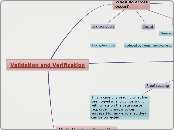a Kezia Bailey 14 éve
978
Validation and Verification

a Kezia Bailey 14 éve
978

Még több ilyen
Checking that data follows the correct rule, for example, a telephone must be numbers only and not letters
checking that something has been written down.
This is when we see a drop-down-box with a variety of options to make, this makes the information easier for the computer to process becasue there is a limit on the answers.
Checking that the data is the correct number of digits long.